Have you ever wondered how much caffeine is in yerba mate? Or how it compares to coffee and tea?
Yerba mate tea is a drink traditionally consumed in South America. Nowadays it’s becoming more popular all over the world because of its refreshing taste and energizing effect. Many people are also switching from drinking coffee to drinking yerba mate, or replacing part of their coffee consumption with it.
In this guide, I will explain everything you need to know about yerba mate caffeine content and how it matches with coffee and tea.
One surprising fact is that 250 milliliters (about 1 cup) of yerba mate tea made with the traditional method, can have almost twice as much caffeine as 1 cup of coffee!
If you just want to quickly compare the caffeine content between yerba mate tea, coffee, black tea, and green tea, take a look at the chart below:
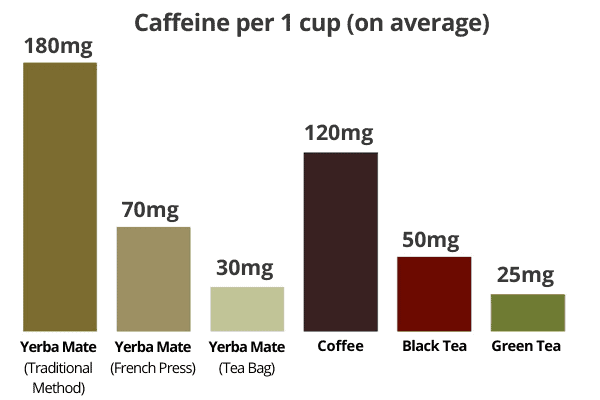
As you can see the caffeine content of yerba mate greatly depends on the brewing method. Of course, the same applies to coffee and tea as well.
There are also other factors that have an effect on the amount of caffeine. The type/brand of the product, and brewing time, to mention a few. Thus, the above chart presents the estimated averages per cup, not exact values that always apply.
How Much Caffeine Is In Yerba Mate Tea?
Yerba mate leaves contain a relatively high amount of caffeine.
The caffeine level of an 8 ounce (0.24 liters) cup of yerba mate tea can range anywhere between 20mg and 180mg.
Maybe you’re wondering, what can cause such a huge variation?
The type of yerba mate product, the amount you use, and the way you brew it, all have a significant effect on the caffeine level of your mate tea.
In general, yerba mate tea brewed with tea bags has the lowest level of caffeine, while mate brewed with the traditional method (gourd and bombilla) has much higher caffeine content.
According to a study from 2009, yerba mate brewed with 50 grams of loose-leaf yerba mate and 500 ml (17 oz) of water had a caffeine content of about 380mg, which equals to about 4 standard cups of coffee.
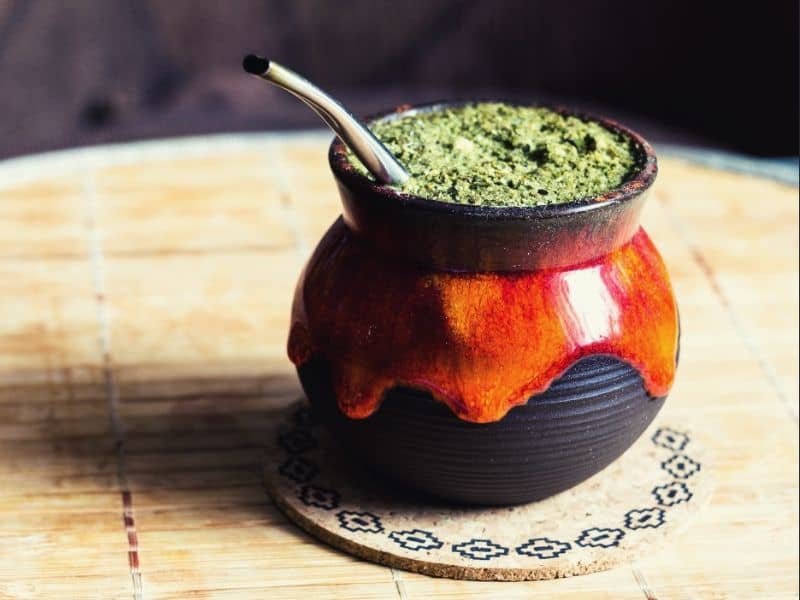
Some people may claim that yerba mate contains matteine which is different from caffeine. However, there is no research that supports this claim and it seems that matteine is just a different term for caffeine.
The effects of yerba mate are truly different from other drinks that contain caffeine, but this is because it also contains two other stimulants: theobromine and theophylline (more about this later).
These days many different types of yerba mate products are available. Yerba mate energy drinks can have very high amounts of caffeine and yerba mate energy shots can go even further in maximizing the level of caffeine.
Coffee vs Yerba Mate Caffeine Content
Dry yerba mate leaves usually contain between 1% to 1.5% caffeine compared to about 1.2% to 3% for ground coffee.
A cup of yerba mate tea contains about 70 mg of caffeine on average, while a typical cup of coffee has 100 mg of caffeine. But as mentioned earlier, the caffeine concentration of mate tea can vary greatly.
In South America, yerba mate is almost exclusively consumed with the traditional method. According to my experience, in North America and Europe, it’s also common to use yerba mate tea bags or French press for brewing this tea.
Therefore, the above-mentioned average caffeine content of a cup of yerba mate tea might not be the most suitable way of measuring.
Difference in Energizing Effect
The caffeine in yerba mate tea seems to act differently compared to coffee.
So what do I mean by this? And how is it even possible?
If you drink too much coffee it can make you feel jittery and uncomfortable. Many people have noticed that yerba mate lacks these side effects entirely.
Yerba mate appears to have a stimulating and calming effect at the same time. The reason is that, in addition to caffeine, yerba mate also contains two other components that stimulate our central nervous system.
Yerba mate leaves contain theobromine, a stimulant that makes you feel good and is also found in chocolate. In addition, it contains theophylline, a stimulant that is said to give you mental energy and is present in green and black tea.
The combination of these three boosters (caffeine, theobromine, and theophylline) works together and creates an effect different from coffee.
Go ahead and watch this informative video that compares yerba mate and coffee:
Looking for information? Read this article that compares yerba mate and coffee.
Tea vs Yerba Mate Caffeine Content
Usually, a cup of yerba mate tea contains a much higher amount of caffeine compared to a cup of green tea. However, as explained earlier, this depends greatly on the brewing method of the mate tea.
A cup of green tea has about 25 mg of caffeine. It is comparable to yerba mate tea brewed with a tea bag.
A cup of strong black tea has approximately 50 mg of caffeine. This is still much less than what yerba mate tea has on average.
So compared to tea, yerba mate is definitely a better energy booster due to its higher caffeine level.
Why I Love Yerba Mate Energy Boost
Yerba mate tea has a long history among South American people. Runners, surfers, football players, martial arts practitioners, and many other athletes use it. Also, regular people are consuming it in order to feel more vibrant and energetic.
Today, yerba mate is available all over the world. Along with coffee and tea, it has become a favorite refreshment for many people — including myself!
I like to drink yerba mate before doing sports because it gives me nice energy levels and focus. Yet, it doesn’t make me jittery or cause a sudden crash after the effect starts wearing off.

Yerba Mate Caffeine Content FAQ
How much caffeine is in yerba mate?
Dry yerba mate leaves usually contain between 1% to 1,5% of caffeine. The caffeine content of yerba mate tea depends on the brewing method and varies between 20mg and 180mg per cup.
How much caffeine does yerba mate have compared to coffee?
A cup of yerba mate tea contains about 70 mg of caffeine on average, while a cup of coffee averages at 120 mg of caffeine. However, the caffeine concentration of both beverages can vary greatly depending on the type of product and brewing method.
How much caffeine does yerba mate have compared to black tea and green tea?
On average, a cup of green tea contains about 25 mg of caffeine while a cup of strong black tea has approximately 50 mg of caffeine. The caffeine content of one cup of yerba mate tea is about 70 mg (it depends on the brewing method). Compared to both green and black tea, yerba mate has more caffeine.
Instead of drinking yerba mate tea, you can also use yerba mate capsules or other supplements. I have also put together an article with more information related to yerba mate extracts and supplements.
As a conclusion, we can say that yerba mate tea is a very refreshing and energizing drink that has relatively high caffeine content.
It is also a healthy drink but you should still avoid consuming excessive amounts of it. Especially if you’re pregnant or sensitive to caffeine. You can read more about the possible side effects of yerba mate here.
If you are planning on buying some mate tea, check out this review article with 5 different yerba mate products. It will help you with choosing the right kind of product for your liking.
I hope you found this article useful. Post a comment in the comments section below and tell me about your experiences related to mate and its energizing effect and caffeine content.
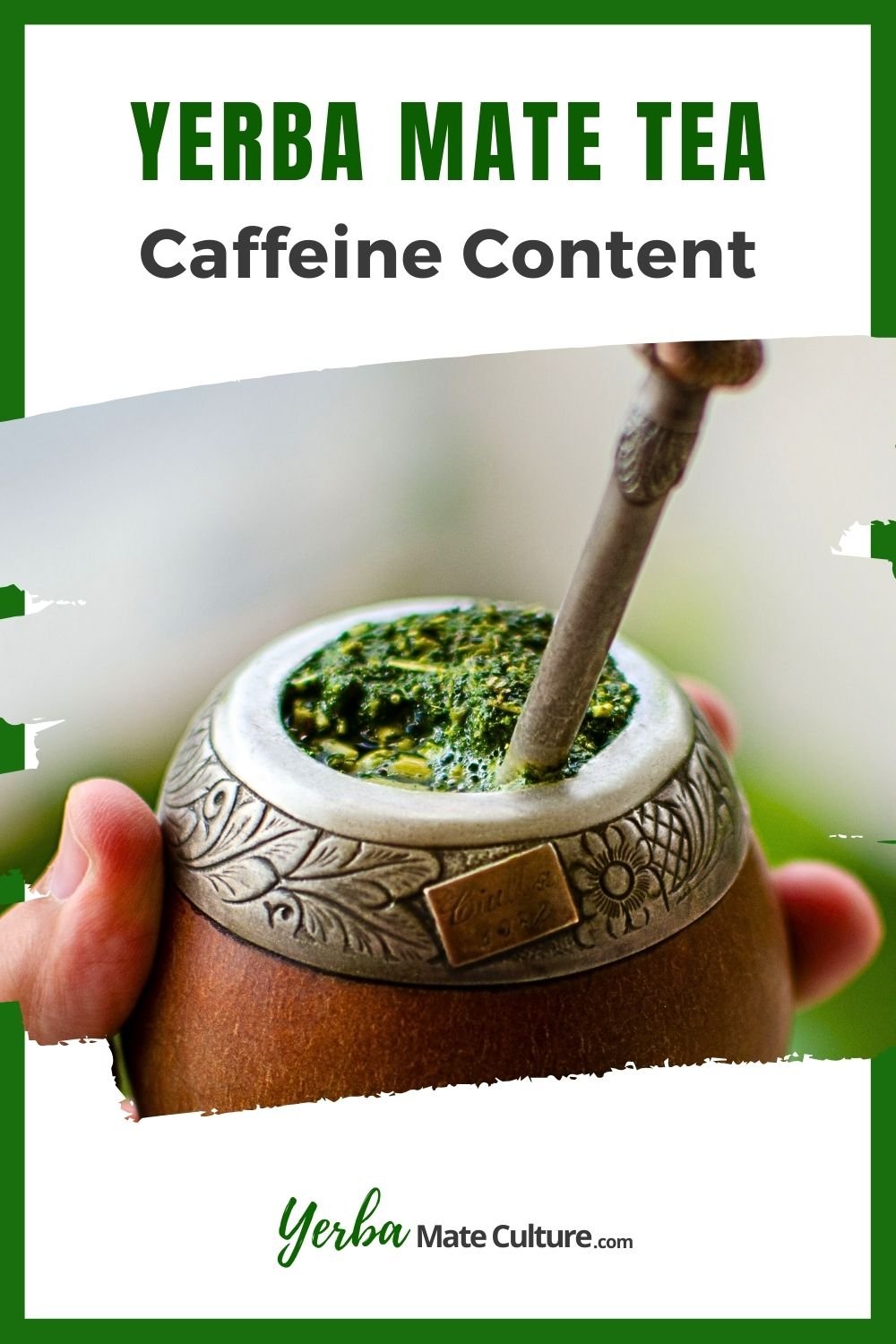

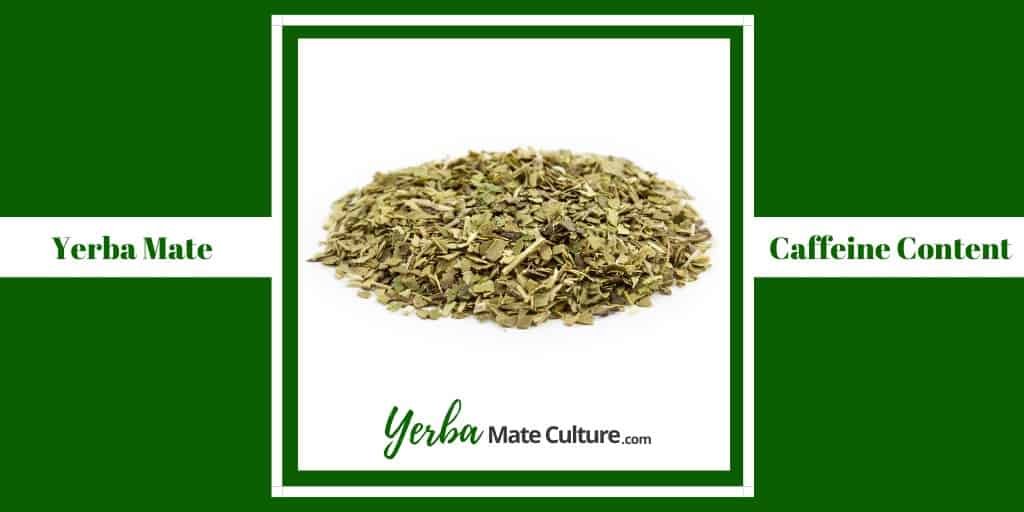
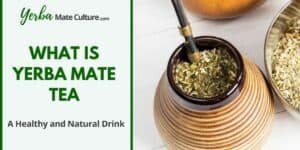
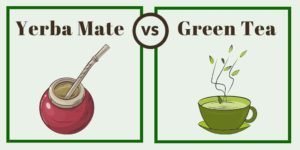
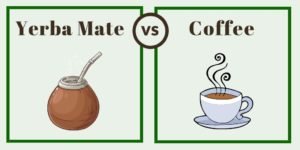
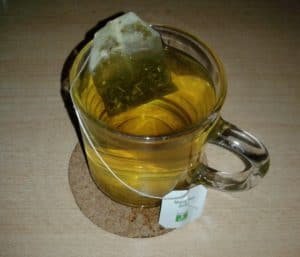
Hi, there.
So, now I know why our yoga teacher actually suggested drinking a cup of Yerba Mate before meditation. Although I can only manage half a cup, I have to say it truly does help with mental clarity and focus.
My husband says, that it has similar effects on him like the serotonin and dopamine in dark chocolate. Yerba Mate does, indeed, make you feel better and happier. It’s become a daily habit to drink a cup (me half) together in the afternoon.
More people should reach for Yerba Mate instead of pills when they’re feeling depressed or low. It’s way healthier and just as effective in the long term.
Thanks so much for this thorough info.
Best wishes,
Keryn
Thanks for your comment Keryn!
The right amount of yerba mate can be very useful before yoga practice and meditation. The theobromine in yerba mate truly is good for your serotonin levels. I also drink yerba mate (almost) every day. For depressed people, I would definitely recommend trying yerba mate, healthy diet and regular exercise before taking any medicine pills.
Cheers,
Joonas
I’ve not been much of a coffee or tea drinker – I tend to avoid caffeine because I don’t like the ‘buzz’ it gives me. Reading the differences between Yerba Mate and tea and coffee, it sounds like it might be a drink that still gives an energy kick, but not in the same way that coffee or tea does. I think I need to read up more!
Hi Zak!
I recommend reading more about yerba mate and trying it yourself. You can check out my review articles here to find out the kind of products that is good for you. If you want to take it easy you can try yerba mate tea bags first.
-Joonas
I never heard of this drink does the flavor resemble tea or coffee?
Also, theophylline is a drug used to treat asthma, chronic bronchitis, and other lung issues. It’s a bronchodilator so I guess it could help with yoga breathing and the caffeine would help with focus.
Hi Melissa!
The flavor is closer to green tea than coffee, but still quite different. You have to try it yourself!
Yes, I think yerba mate tea is excellent for yoga breathing and other exercises too. I have allergies and it seems to help with that too.
-Joonas
I have never heard of yerba mate before. As an avid coffee enthusiast and occasional tea drinker my body knows all about the buzz left after one too many a cup. The benefits of using this as an alternative to caffeine seem extremely beneficial. How would you describe the flavour?
Hi Ben,
The flavor of yerba mate is kind of grassy and earthy, it is also a little bit bitter. The taste varies according to the product and how it has been grown and aged. When I tasted yerba mate tea the first time, I didn’t think it was very good nor bad. After I started drinking it more often, mainly because I replaced coffee with it, I started to enjoy the taste more. If you make an ice tea from yerba mate and add some lemon and honey, that’s probably the best tasting option for a first-timer!
-Joonas
The title or article is misleading, a person who drinks Yerba Mate with Bombilla (i think it’s probably around 90%-99% of people) will not know how much caffeine is inside, based on this article. Who measures yerba mate in “cups”? Also, why you put a picture of Matcha tea?
Thank you for the feedback.
I added information about the caffeine content of yerba mate prepared with the traditional method (gourd and bombilla) where 50g of dry mate and 500ml of water is used. You are right, everyone in South America uses a gourd and bombilla for drinking mate. However, I know many people who drink yerba mate but they are not using a gourd and bombilla. They are not from countries that have a tradition of consuming mate but from the US and Europe. These people prefer brewing mate with a french press or tea bags because they think of it as a herbal tea amongst other herbal teas.
I have included a picture of matcha tea in a chapter called “Yerba Mate vs. Tea” because I think it fits the context.
-Joonas
I couldn’t live without tea. I try to stay away from caffeine so that makes my options slightly more limited, and tea has so many more choices for decaf than coffee does (I also prefer iced coffee over hot). I love anything fruity, decaf green tea, and lemon black tea. There are very few teas that I dislike other than chai!
Thanks for commenting Lorrie. Since you are trying to stay away from caffeine herbal teas/infusions are probably the best choice for you.
-Joonas
Hello Joonas,
Can I correct you please , with all respect!
I am allergic to caffeine – all coffees make myself feel sick ( instant coffee) to really ill & depressed for several days ( strong, percolated coffee ) , so I obviously can’t drink coffee for this reason –
This is how I know that Yerba Matè does NOT contain caffeine. I have seen molecular structures from from Yerba Matè, from scientist’s drawings of a similar-looking substance to caffeine, but the effects are nothing like the effects of caffeine – just the opposite in fact!
I drink up to 3 litres of Yerba Matè infusion daily with no ill-effects, only feelings of elation and refreshment!
Thank you for the article, it was very informative, except for this important error.
I live in U.K., Europe and use a gourd sometimes , but mostly a 2 litre French Press.
Hi Mr J.Morgan
Thanks for your comment. Could you provide a link to a reliable study that confirms that yerba mate does not contain caffeine?
So far I have only seen studies that say it contains caffeine so I would need some evidence to change my article.
Thanks,
Joonas
https://www.erowid.org/plants/yerba_mate/yerba_mate_chemistry1.shtml
I think this link will provide some science on the comment above.
Thanks for your comment Ron!
That’s a very good link and I agree with the explanation it provides.
According to an article posted by the Mayo Clinic, long term studies indicate that known carcinogens in Mate can lead to throat, mouth and other types of cancer when consumed warm or hot in large quantities. I believe they recommended keeping consumption to moderate levels and definitely not exceeding more than a liter per day. I’m not a doctor but further research should be done on this herb. The benefits are many, but we should not ignore the side effects. The key is moderation and avoiding anything in excess. I love Mate and I consume mine from a gourd and bombilla. One cup is enough for me to keep me refreshed for most of the day.
I agree that to avoid any side effects it is best to consume yerba mate tea in moderation.
When it comes to cancer risk, the best way to minimize it is not to drink mate tea when it’s too hot. You can also choose a yerba mate product that has not been dried without smoke to avoid any carcinogens.
Have noticed that the Mate tea bags I have say not to boil the water. Which, curiously, is also true in all instructions i have seen for Jiaogulan tea. Jiaogulan is not stimulating like Mate or coffee, but has many interesting benefits. Recommend you check it out. As to the gentleman who found he is allergic to caffeine but not to mateine, I have two speculations.
First, it may be that the molecular structure is just different enough not to trigger the caffeine allergy. Second, the inventor of Bulletproof coffee, Dave Asprey, has had numerous allergies in his life. He found that the way almost all commercial coffees are processed cause them to have something called Ocratoxins (sp?) that many people have allergies to. He found that if you buy a single bean Arabica Coffee that is grown in the mountainous areas of Central America and has been wet-processed. that there are none of those toxins present.
Hi Roland,
Thanks for your comment. Jiaogulan sounds interesting!
One reason that yerba mate should not be brewed with boiling water is that it can become too bitter.
When I drink coffee, I always go for high-quality Arabica coffee as well.
Never had any allergic reactions with yerba mate or coffee, but I have noticed that some cheaper coffees cause stomach problems like acid reflux.
-Joonas
Aloha from Hawai’i Joonas !
My name’s Ted and i am a matero [i.e., a yerba mate enthusiast]. Using certified organic yerba mate is important because of agrotoxins*. And alsoly important is to moderate the amount of intake of polycyclic aromatic hydrocarbons (PAHs) by mostly using smokeless / smoke-free yerba mates ; and for times when desiring a smoke flavor in mate , making a blend of a yerba that has smoke flavor with a yerba that is smoke-free : it’s not just healthier but tastier because the taste of smoke-free yerba is still present.
Peace to you and yorn.
*Agrotoxins are the key ingredients of industrial agriculture. They are made up of poisonous chemical substances including pesticides, defoliants, herbicides and fungicides.
Hi Ted,
I also often drink organic unsmoked mate even if it’s more expensive than regular brands.
The cancer danger actually comes from the traditional drinking method, boiling hot in a bowl w/bombilla, rather than the mate itself. Its always recommended to not drink boiling water.
Yes, that’s right! Also, if the yerba mate is smoke dried it might contain some carcinogens.
Have you considered that you’re reacting to another compound in coffee besides caffeine? Do caffeine pills cause you the same issues?
I had heard about Yerba Mate but never cared. Not until Andrew Huberman, professor of neurobiology and optiomology at Stanford School of Medicine, talked about it in his amazing podcast Huberman Lab.
This is a guy I really trust ???? so I instantly ordered a starter kit. A kit with gourd, bombilla plus three different kinds of Yerba Mate (plain Argentinian, Guarana flavored Argentinian and plain fine cut Brasilian.)
I am only in the end of my second day but I love it! The taste (with or without extra flavor) as well as the effect. I might still drink a first coffe in the morning but then I will stick to Yerba Mate. When I’m busy and on the run, made in a French press, when suitable the traditional way.
Hi Mats,
Nice to hear the story about how you found yerba mate. I have been drinking it now for over 10 years and I love it!
I also drink a cup of coffee occasionally but mostly yerba mate.
Here is one thing I suggest you try: Make some yerba mate in a French press, pour it into a pitcher and add a bit of lemon juice and honey. Then refrigerate it and enjoy it with ice during a hot summer day. Iced yerba is super refreshing!
All the Best,
Joonas
Hi!
I am of Paraguayan origin and grew up with my late father drinking mate in the traditional way. I have a question and two suggestions 🙂
As I can sit with a gourd and bombilla and refill it many times over the morning I am wondering if the caffeine quantities are exhausted after a while or if I am extracting over and over. Specifically since my kids love Mate but I want to be mindful of caffeine intake.
For those that want to try a refreshing drink they could try “Tererè” , which is simply Mate with icy water. In the very hot summers in Paraguay people love on it. They walk around with a thermos.
For those that like a slightly sweeter variation you can try “Mate Cocido”.
PS
It s fascinating that the little country fo Paraguay has given the world Mate (Ylex Paraguayensis) and Stevia (possibly one of the better natural sweeteners)
Hi Manuel,
Thanks for your comment!
I think that the more times you infuse the same mate the less caffeine there will be. But it’s hard to know exactly how much.
I actually have a Tererè recipe here on my site. But I have never tried Mate Cocido.
Best Regards,
Joonas
This article is useless. How can one know how much caffiene is in a cup of yerba mate if you do not dicuss the amount of loose leaf used to brew it?
Thank you for the comment, but maybe you should read the article properly before dropping this type of comment. Like this part for example: “According to a study from 2009, yerba mate brewed with 50 grams of loose-leaf mate and 500 ml (17 oz) of water had a caffeine content of about 380mg, which equals to about three cups of coffee.”.